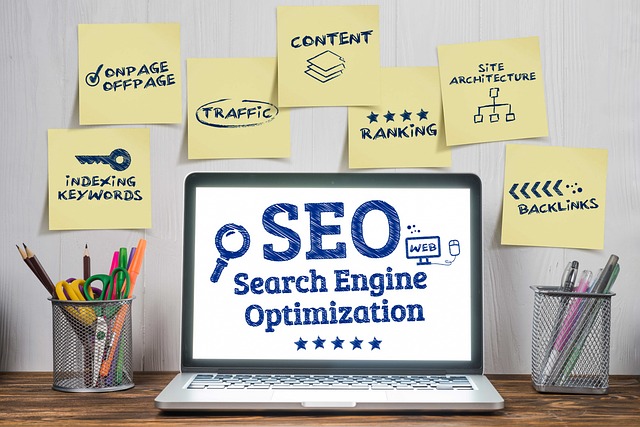Introduction
You might be thinking: “Where do I start with SEO?” Being a consistent and enthusiastic blogger, you are dedicated to your craft by researching and creating insightful articles on relevant topics which you and your target audience loves.
However, despite your efforts and dedication, there is little traffic being driven to your blog. Did you know that over 50% of all website traffic comes from organic search and not paid advertising? This underscores the importance of Search Engine Optimisation (SEO) in driving visibility online and attracting potential clients to your content.
In this comprehensive guide on how to learn SEO for beginners, we will explore the SEO universe, demystify core SEO concepts and provide you with a step-by-step guide on how to start learning SEO to eventually master it.
Whether you are a freelancer, entrepreneur, content creator, coach, consultant or digital marketer, understanding SEO is essential for ranking in search engines, improving your online visibility and growing your audience online.
What is SEO?
Search Engine Optimisation (SEO) is defined as the practice of optimising your website and web pages to increase its online visibility across the internet and in search engine results pages (SERPs). By improving your website’s SEO, you can attract more organic traffic (not paid traffic) from search engines such as Google, Bing and Yahoo, among others.
How to Learn SEO for Beginners

You might be wondering: “How long will it take to learn SEO?” Learning SEO for beginners can seem complicated and daunting, but with a structured step-by-step process, you can master the cycle of SEO effectively.
Understanding the Problem: Challenges faced by Beginners

When starting to learn SEO, beginners often encounter several challenges:
- Complexity
- SEO terminology appears complex, overwhelming and difficult to understand, such as keywords, backlinks, SERPs, algorithms.
- Ongoing updates
- Search Engine Algorithms change continuously, which impact on SEO strategies being taught and implemented.
- Information Overload
- Researching through vast amounts of data and information online can be confusing and can adversely affect the confidence of the beginner’s journey into the world of SEO.
The Solution: Learning SEO effectively
To address the challenges above, the following steps can be taken to enhance the SEO learning experience.
This approach supports comprehensive SEO learning with an emphasis on practical application and skills transfer.
- Foundational Knowledge
- The student will start with an understanding the basics of SEO principles before advancing to more complex SEO concepts.
- Practical Application and Experiential Learning
- Theoretical concepts and knowledge are applied through hands-on practice to reinforce the learning and to enable skills transfer.
- Adaptability and Flexibility
- It is important to keep updated with the latest SEO industry trends and algorithm changes to maintain relevance and effectiveness in the market.
- Continuous Improvement
- It is advisable to regularly evaluate and refine SEO strategies based on key performance indicators and metrics.
Step-by-Step Guide to Learning SEO

Master the Basics
- Keyword Research – Tools such as Semrush, AHRefs, Google Keyword Planner and UberSuggest are used to identify relevant primary and secondary keywords for your specific niche.
- On-Page Optimisation – It is important to optimise the content of your website including content, meta tags, headings and targeted keywords.
- Technical SEO – This is critical to ensure that your website is mobile friendly, has quick loading times and uses secure Https protocols to enhance website security.
Explore Trusted Resources
- SEO Courses – To enhance your SEO skills, enrol is online courses on platforms such as Udemy, Coursera and HubSpot Academy
- Industry Publications and Blogs – Follow experts in the SEO industry such as Moz, Neil Patel and Search Engine Land for regular updates and best practices.
- Books – Books such as “The Art of SEO” by Eric Enge, among others, offer authority about SEO and provide an in-depth analysis on SEO strategies and best practices in the ever-evolving SEO industry.
Practical Hands-On Practice
- Content Creation – It is important to create high quality, SEO optimised content on your website or blog which resonates with your target audience.
- Link Building – Acquiring backlinks or referrals from reputable websites to improve your website’s authority and credibility is an important SEO strategy to assist with your site’s ranking and online visibility.
- Analytics – Tools like Google Analytics are used to track website traffic, user behaviour and conversion rates.
Staying Abreast of Trends
- Algorithm Changes – As the search engine algorithms are constantly being updated, it is important to monitor updates from search engines to adapt your SEO strategy accordingly and to remain relevant to search engine crawlers.Search engines work by crawling, indexing and ranking the content of all websites on the internet. Crawlers discover online content through web crawlers or “spiders.”Thereafter, the indexing process analyses and stores the content in the search engine’s index.Ranking then serves the index’s most relevant content to users based on a user’s search.
- Emerging Techniques – Learn about new SEO trends such as structured data markup and other emerging trends and techniques.
- Networking – Join SEO communities online and engage with them by attending webinars and actively participating in various forums to exchange and add to the SEO body of knowledge.
What is SEO in Marketing?
SEO plays a particularly significant role in Marketing by:
- Increasing Visibility
- By helping businesses rank higher in search engine results pages (SERPs) to attract more organic (not paid) traffic
- Driving traffic and engagement
- By providing high quality content which meets the user’s search intent and encourages interaction
- Building Authority
- By establishing the brand as a trusted industry leader through valuable and optimised content.
Is SEO Still in Demand?
SEO is still highly relevant and remains in demand for several reasons:
- Cost Effective
- In comparison to paid advertising, SEO generates long-term organic traffic without ongoing expenses.
- Enhances Credibility with Users
- Users trust organic search results more than paid advertising, which leads to higher click through rates and conversions.
- Competitive Advantage
- Effective SEO strategies can assist small and medium sized businesses to compete with larger companies on the same baseline and level playing field.
Five Important Concepts for SEO
To succeed with SEO, it is important to master the following key concepts:
- Keyword Research
- The process of identifying relevant keywords with high search volume and low competition to rank successfully in search engines.
- On-Page Optimisation
- Optimising meta tags and meta descriptions, headings and content with targeted keywords for improved relevancy.
- Link Building
- The process of earning quality backlinks and referrals from other websites to enhance a websites credibility and authority.
- Technical SEO
- The process of ensuring that a website is optimised for mobile responsiveness, speed and crawlability by search engines.
- Analytics and Measurement
- The process of tracking SEO metrics such as organic traffic, keyword rankings and conversion rates to evaluate the website’s performance in orde to make data-driven decisions.
Content Creation and SEO
Content creation is the bedrock of all SEO strategies as it directly impacts how a website ranks in search engines.
To optimise the content creation process for improved SEO, these are the steps to follow:
- Step 1: Understanding your target audience and their goals
- Before developing website content, identify your target audience and their specific requirements.
- Conduct detailed keyword research to discover topics and ideas which resonate with your target customers and which align with your business goals.
- Step 2: Create high quality and optimised SEO content
- Content needs to be relevant, informative and engaging to your target audience.
- Keyword placement:
- Include relevant keywords naturally throughout your content, in titles, headings, meta descriptions and body paragraphs.
- Depth and Quality: Create detailed and high-quality content which provides value to the customer and which answer’s the user’s query and search accurately.
- Readability: Structure content with clear headings, sub-headings and bullet points to improve readability and user experience.
- Step 3: Refresh your content regularly to remain relevant
- Regularly update your content to remain relevant and add value to your target audience.
- Search engines value fresh content and as such, it is advisable to refresh older website content and posts with latest information and relevant insights.
- Step 4: Optimise and Enhance Multimedia Elements on your website
- Multimedia elements include images, videos, infographics and charts.
- Alt Text: Optimise images alt text with primary keyword descriptions to improve accessibility and SEO.
- Video SEO: Optimise video titles, descriptions and tags to increase visibility in video search results.
- Step 5: Promote and build high quality backlinks from authoritative websites
- Promotion of content can take place through social media, email newsletters, via industry influencers and authoritative websites.
- Building backlinks from reputable sites could enhance your website’s authority and will improve its ranking in search results.
- Step 6: Measure and analyse performance for continuous improvement
- Tools such as Google Analytics assist with tracking the performance of a website’s content. This includes:
- Traffic Sources – to monitor which channels drive the most traffic to your website.
- Engagement Metrics – to track metrics such as bounce rate, time on page, social likes and shares and user engagement.
- Conversion Rates – to measure how well a website’s content converts visitors into leads and paying customers.
- By following these content creation techniques, a website’s SEO performance is enhanced resulting in attracting more organic traffic which assists in achieving the objectives of the digital marketing objectives effectively.
- Tools such as Google Analytics assist with tracking the performance of a website’s content. This includes:
Frequently Asked Questions (FAQs)
What is SEO in Marketing?
SEO, or Search Engine Optimization, in marketing is the process of improving a website’s visibility on search engines like Google. It involves using keywords, optimising content, and building links to help the site rank higher in search results. By doing SEO effectively, businesses can attract more website visitors and increase their chances of converting those visitors into customers.
Is SEO still in demand?
Yes, SEO remains essential in today’s digital landscape because it directly impacts a website’s visibility and organic traffic from search engines like Google. Businesses use SEO to optimise their web pages with relevant keywords, improve user experience, and build authoritative backlinks. By investing in SEO strategies, businesses can enhance their online presence, attract targeted traffic, and achieve higher conversion rates, making it a crucial component of digital marketing efforts.
How to learn SEO step by step for beginners?
To learn SEO step by step as a beginner, begin by mastering keyword research using tools like Google Keyword Planner, AHRefs or SEMrush to identify relevant search terms. Next, focus on on-page optimisation by optimising title tags, meta descriptions, and content with targeted keywords. Lastly, learn off-page SEO techniques such as building quality backlinks through guest blogging or networking with influencers to improve domain authority and increase organic search rankings effectively.
Conclusion
You might be asking yourself: “Where do I start with SEO”? By following the steps highlighted in this guide, you will gain a comprehensive and holistic understanding of SEO and the steps required to master this valuable skill. Once implemented, the beginner will be well equipped to improve their website’s visibility with search engines, attract organic traffic and achieve their online goals and objectives.
Are you ready to enhance your digital footprint through SEO? Start applying the techniques and principles highlighted in this guide.
Whether you are optimising your content, refining your website structure and remaining updated with industry trends, each marginal action adds to your overall SEO success.
As a beginner starting to learn about SEO, embrace your digital journey, adapt to changes in search algorithms, continually learn and explore various SEO concepts and your website will thrive in the competitive digital landscape.
Ready to learn more about SEO? Contact www.cyrilliafernandez.com to explore more interesting concepts and practical training to enhance your SEO journey even further.
To learn more about how to start an online business, click here to read the Comprehensive Guide.